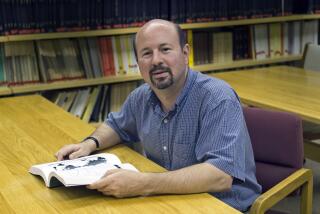What Is Transparent Is Our Need to See Things Clearly
- Share via
This is the kind of good news/bad news story I love because it not only sheds light on scientific fraud, it touches on everything from corporate book-cooking to the Homeland Security Act, the 1st Amendment, the practice of astronomy and the everyday act of looking out the window.
First, the bad news: Last year, the Lawrence Berkeley National Laboratory had to retract its previously announced discovery of new elements 116 and 118 when no research group (including the group that originally made the discovery) was able to duplicate the results. Now, the lab’s internal investigations have concluded this was not simply a mistake. It was fraud. Someone faked the data, and was fired.
Now, the good news: It’s the same as the bad news. This is precisely how science is supposed to work. Because it is transparent, cheaters get caught. (For the record, the accused scientist has filed a grievance against the lab for wrongful termination.)
Why wasn’t the fraud caught sooner? Because transparency is not a simple matter.
Take the clothes you’re wearing. Are they transparent? You’d probably say no, unless you came to the breakfast table wrapped in cellophane. But while your PJs may be opaque to the prying eyes of your neighbors, they are quite transparent to radio signals, cosmic rays or neutrinos. (Even a light-year’s worth of solid lead is transparent to neutrinos.)
At the same time, your kitchen window, although it appears transparent, is, in fact, opaque to ultraviolet light, which is why you can’t get a suntan indoors.
Even on a clear day, the air itself is transparent only to a narrow range of light--visible wavelengths, radio, and a bit of infrared and ultraviolet. To see the full range of electromagnetic radiation, telescopes have to go into space, where they can “see” gamma rays, X-rays and the rest.
(It’s a good thing the atmosphere’s ozone layer is opaque to most UV radiation: If it weren’t, we’d all be fried.)
Only gravity manages to see through everything in the universe. Nothing can hide from it, which is why gravity wave telescopes hold such great promise. Light can’t escape from black holes, but gravity waves can and do. Just as gravity reaches inside your clothes to pull on your underwear, so its signals travel to us undisturbed from the very beginning of time and can tell us what happened in some detail even during the big bang.
Transparency is tricky. It depends on how you’re looking and what you’re looking through. The Berkeley scientists got fooled by the same incorrect assumption that leads some people to think they can get a suntan through the window: something they thought was transparent actually wasn’t. In this case, it was the workings of their own group.
“There was extreme reliance on one individual because he was considered to be the world’s greatest expert in this area,” said deputy lab director Pier Oddone. “He was the heart and soul of putting the experiment together. [Fraud] was the last thing anyone would have expected.”
There was more. The results were too “pretty” to ignore, said Oddone. They fit expectations so beautifully that no one believed this wasn’t Mother Nature’s own artistry at work. If some computer makes a mistake, Oddone said, “you don’t expect the Mona Lisa to jump out at you.” The results were too wonderful not to be true.
The combination of beautiful results and trust in a colleague, Oddone said, led the scientists to be “absolutely seduced.”
It’s all been embarrassing for Berkeley. But in the end, the very transparency of science--the fact that no result is accepted unless and until it is checked (and rechecked) by someone else--is what keeps the enterprise strong.
Just so, democracies protect transparency through everything from a free press to citizens with video cameras keeping an eye on cops to a guarantee of legal aid for those accused of breaking the law.
Which is why people are troubled that Bush’s proposed Homeland Security Department would be exempt from the Freedom of Information Act and provisions of the federal whistle-blower protection. Which is also why, despite the threat of terrorism, people are uneasy with secret military tribunals and the erosion of civil rights.
At the same time, ordinary American investors, such as the Berkeley scientists, allowed themselves to be seduced by wishful thinking and wonderful results: a soaring stock market in a booming economy. We wanted to believe that corporate profits were honestly reported, and so we did. It never occurred to us that things could be so crooked right in our own backyards.
Naked truth isn’t always pretty, and glass houses are uncomfortable for everyone. Even so, when it comes to public institutions, the price of strength is often just such transparency. It’s worth a lot more than meets the eye.






